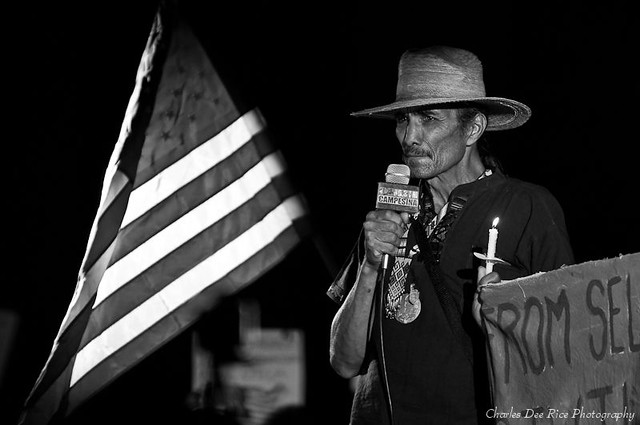All Politics is Local: The Democratic
Party’s Abandonment of the Core
By Rodolfo F. Acuña
The fitness exercise pilates, from my limited understanding of the
exercise method, works on the principle of developing “a strong core or center
(tones abdominals while strengthening the back), and improving coordination and
balance.” The principle fascinates me because it can be applied to almost any
endeavor.
For example, when San Jose State Chicano professors approached me in 1969
with a plan to start a Mexican American Studies program at the Master of Arts
level, I responded that I did not believe that a MAS graduate program could
grow without a solid undergraduate degree. My thinking was that “a strong core
or center” had to be developed to allow for the coordination and balance of a
large program.
The core’s abdominal muscles are the masses of students. The only
programs that are subsidized in the higher education are those blessed by the
institution. Logical persuasion would not develop a discipline or method
to educate neglected sectors of society. You needed bodies to build the
core.
I have applied this principle to politics. Unless you have bundles of
money such as the case of Republicans and you can buy elections, Mexican
Americans and Latinos are not going to bring about changes in the political
arena. A strong core is essential for coordination and balance to leverage this
outcome.
The building of the political core does not depend as much on individual
political activism as it does on the core, which is not built by electing
Latino elected officials. You can have progressive representatives such as
Arizona Congressman Raul Grijalva but his power although concentrated at the
core can easily be isolated by the system.
In many ways Grijalva is an aberration, elected in an island of Mexican
American and white liberal constituents. Even so he has problems raising
political capital and he has organized successful re-election campaigns despite
the Democratic National Committee whose main purpose is keeping control of the
White House.
I learned this lesson in 1996. Two years before the presidential
election, we organized a highly successful anti-187, the anti-immigrant
proposition, march. This was the first time that over a hundred thousand
Latinos took to the streets of L.A. It gave us a feeling of power and many
activists wanted to replicate it in 1996 in opposition to Proposition 227, the
anti-affirmative action ballot measure.
Word came down that what was important was to get Bill Clinton re-elected
to the White House. The California Democratic Party then proceeded to dry up
funds for the march, badly dividing community activists and Latino politicos.
We never recovered and it carried over to 1998 in the fight against 227,
the proposition to eliminate bilingual education. The gigantic marches were not
revived until the second half of the next decade when the core was re-energized
by youth and immigrants that had been politicized by 187 and by sporadic school
walkouts throughout the L.A. basin. Youth could not be channeled like community
organizations and labor that looked to Latino politicos for leadership and
funds.
Thus, the core never developed muscle or balance and it remained
dependent of the political establishment and the media.
Based on my experience I have found the core in Arizona worse off than
California. The state has been kidnapped by the Republican Party, with the
Democratic Party leaders concentrating on keeping the White House. The
rationale is “things could really get bad if Romney gets in the White House,”
which is true unless you figure that things are already bad and the White House
is not doing anything about it.
The Arizona experience is a valuable case study. It explains why in
Mississippi where the black population numbers over a million and makes up 37
percent of the state, Mississippi has only one black congressman out of four.
If the Democratic National Committee would have channeled funds into
Mississippi and other southern states with sizeable black populations,
undoubtedly the core would be stronger.
In Arizona, where almost a third of the state is Latino, only two of
eight congressmen are Mexican American. The Tucson Unified School District is
upwards of 60 percent Latino but has two of five board members (really one).
You would think that there would be concern on the part National
Democratic Party and that it would spearhead a restructuring of the Arizona
Democratic Party to reflect its presumed progressive agenda versus that of Tea
Party Republicans.
But it ain’t so. The strategy of the DNC has been to support Blue Dog
Democrats who have sold out on the issues of the economy, immigration and the
struggle to save Mexican American Studies in Tucson. In the process, racism has
become constitutional in Arizona.
The wrongheaded strategy of the past is repeated. Everything is
justified if Barack Obama is re-elected. It doesn’t matter that he has
been mute on the Minutemen assassination of nine-year-old Bresenia Flores and
that his Justice Department has been mute about enforcing the U.S. Constitution
vis-à-vis enforcement of desegregation orders. This, according to the DNC
strategy, will be rectified by making the Arizona Democratic Party more
conservative and even vote with Republicans.
According to this wrongheaded strategy, it will make Obama look more
palatable to right wingers.
Consequently, the Democratic Party core in Arizona is so flabby that it
stands for nothing. The failure to develop the political core of the Arizona
Mexican American is glaring.
Presently, a well-qualified and intelligent candidate is running for
Arizona’s First Congressional District. Wenona Baldenegro is a Harvard trained
attorney. A Navajo with strong ties to the Native American and Mexican
American communities, she represents the best in those groups. Instead of
supporting Wenona, the national party is supporting a reactionary Blue Dog
Democrat with Tea Party ties and is actively working to sabotage her candidacy
by pressuring donors not to fund her campaign.
Another example of the weakening of the core is the federal court’s
appointment of Special Master Willis D. Hawley to oversee the controversy over
HB 2281 and the elimination of the highly successful Mexican American Studies
Program. Without a core, Mexican Americans have been unable to check the co-opting
of Hawley who knows absolutely nothing about the education of Mexican American
children.
I make this criticism only after of months of patient waiting. I did not
want my biases toward multi-culturists to in anyway affect the outcome. Blame my
Catholic school training and its belief in redemption.
However, my fifty years in academe have hardened my opinion toward
multiculturalists who range from friendly touchy feely people to arrogant
academics.
Some are good scholars. They want a better society. But, many think that
they know more about what is good for minorities than minorities themselves.
I have had to fight them in committees because they failed to see the
necessity for Chicanos to determine their own pedagogies. Consequently, they
have undermined Chicana/o and African American Studies programs because they
see no need for them to build their cores.
If you want a Chicano, African American or an Asian American center,
their solution is, let’s save money and throw you all into a multi-cultural
center.
Self-determination is not a nationalist demand; it is the aspiration of
every living person. Communities should determine their futures and the role of
political parties is not to manipulate them but to strengthen them.
Perhaps if our political cores were stronger, the Democratic Party would
not sell us out as in Arizona and other states.
With this said, like in the days of the Romans, we don’t have to worry.
Our cores will get fat and flabby as we get free bread and circuses during
Cinco de Mayo. People will celebrate it without knowing its historical message,
which was that Mexico was not open to foreign colonialism and that the
separation of church and state was the law of the land.
































